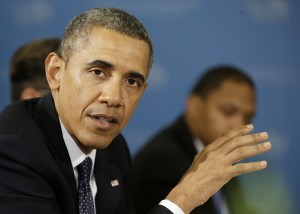WASHINGTON – US warships in the Mediterranean remain ready to “strike hard” against the Syrian regime if ordered by President Barack Obama, the Navy’s top civilian said on Wednesday.
Even as Washington put off possible military action against Damascus to pursue a last-ditch diplomatic solution, comments from Navy Secretary Ray Mabus provided a reminder that American destroyers equipped with cruise missiles are still in place in the eastern Mediterranean with no orders to leave.
“Two weeks ago, when new and horrifying images from Syria flashed across our televisions and streamed across our iPads, the US Navy and Marine Corps team was already there, in the Mediterranean and the waters of the Middle East,” Mabus said in a speech at the National Defense University.
“I guarantee you that if we are called upon to strike, we will strike hard and we will strike fast,” Mabus said.
He spoke a day after Obama delivered a televised address to the country arguing for “limited” military action if President Bashar al-Assad’s regime refuses to give up its chemical weapons arsenal.
“As the president said last night, it (the attack) will be targeted and it will degrade the Assad regime’s capabilities,” Mabus said.
The Navy secretary’s remarks underlined that naval forces will be at the forefront of any US attack on Syria, which is expected to rely mainly on Tomahawk missiles launched from vessels at sea.
Four US destroyers armed with cruise missiles were deployed to the eastern Mediterranean after the Syrian crisis escalated, as Obama weighed possible punitive strikes over an alleged chemical weapons attack by the Assad regime. An aircraft carrier strike group, including the carrier USS Nimitz along with warships armed with Tomahawks, was also sent to the Red Sea and is still there.
Defense Secretary Chuck Hagel meanwhile phoned the commander the USS Barry, one of the four guided-missile destroyers deployed to the Mediterranean, to thank the crew for staying at sea beyond their scheduled tour, the Pentagon said in a statement.
“Secretary Hagel thanked Commander (Tom) Dickinson and his sailors for their service during this period of heightened readiness,” it said.
In his speech, Mabus cited the Navy’s role in the confrontation with Syria as an example of the value of America’s vast naval forces.
“We didn’t have to surge forces. We didn’t have to surge equipment. We didn’t have to escalate the situation. The nation had immediate options because of our immediate presence,” Mabus said.
“We reassure our partners that we are there, and remind those who may wish our country and allies harm that we’re never far away. That is American seapower.”
But he warned that “mindless” automatic budget cuts and political stalemate in Congress threatened to undermine America’s naval reach.
He said that “if Congress fails to act to correct course there is the potential to seriously diminish and permanently harm America’s indispensable maritime forces endangering not just our country but the world.”
Within 12 to 18 months, sailors and US Marines will deploy without necessary training, Mabus said, opening the way to what he called a “hollow force.”
